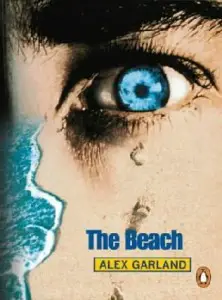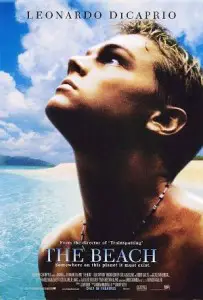 Coming to Thailand and not reading Alex Garland’s The Beach is like going to the Louvre and not waiting in line to see Mona Lisa. It took me quite a while to get my hands on The Beach, but once I did, I couldn’t put it down. I’m sure that many people around the world saw Danny Boyle’s adaptation of the novel in 2000 (an immediate success with Leonardo DiCaprio in the lead role), but I wonder how many had read the book, too?
Coming to Thailand and not reading Alex Garland’s The Beach is like going to the Louvre and not waiting in line to see Mona Lisa. It took me quite a while to get my hands on The Beach, but once I did, I couldn’t put it down. I’m sure that many people around the world saw Danny Boyle’s adaptation of the novel in 2000 (an immediate success with Leonardo DiCaprio in the lead role), but I wonder how many had read the book, too?
Actually, the book was published four years before the movie was out and it marked Garland’s literary début. The Beach was subsequently followed by The Tesseract (1998), a novel set in the Philippines, also made into a movie in 2003, and The Coma (2004), a novel about the human mind, adapted into a play in 2006. Alex Garland has also written screenplays and video games, fact which is not surprising at all for anyone who has read The Beach. The book reads like an extended screenplay with an overwhelming feeling that the characters are players inside a mammoth video game.
The novel starts on Khao San Road with Richard, a young English traveler, who enters into the possession of a map pinpointing to the location of Eden, an idyllic beach unspoiled by tourism in the south of Thailand: “The map was beautifully coloured in. The islands’ perimeters were drawn in green biro and little blue pencil waves bobbed in the sea. A compass sat in the top-right-hand corner, carefully segmented into sixteen points, each with an arrow tip and appropriate bearing. At the top of the map it read ‘Gulf of Thailand’ in thick red marker. A thinner red pen had been used for the islands’ names. […] Then, on one of a cluster of small islands I noticed a black mark. An X mark. I looked closer. Written underneath in tiny letters was the word ‘Beach’.”
With the map in his backpack, Richard travels from Bangkok to the Island of Samui in the company of Étienne and Françoise, two French lovers he meets in Bangkok. From here they plan travel to Ko Phelong and then to swim to the island of Eden. Richard, prompted by his two travel companions and being an adventurous type of guy, cannot say no to the dangerous task of swimming out in the open sea to the island: “The fact is, I’ve never grown out of playing pretend, and so far there are no signs that I ever will.”
Once they find Eden, the three of them rapidly accommodate to the beach life and their duties. At first, part of the fishing detail, in charge of catching the fish needed for dinner, Richard starts spending more and more time in the presence of Françoise whom he secretly desires. But, once Sal, the leader of the beach community, removes Richard from the fishing detail and reappoints him to work with Jed, we gradually see a rift between Richard and the rest of the community.
It is while working with Jed (whose job is to steal marihuana and stay on the look-out for incoming travelers) that Richard finds out about the history of their beach (which goes back to 1989) and the dangers that lurk within the thick jungle that surrounds the beach. Little by little, Richard is immersed in risky “missions,” influenced by Vietnam War movies and the psychedelic manifestations that bring back to life Duffy, the Scotsman who, before committing suicide, had given him the map.
 Things turn ugly when a shark attacks, kills and injures the fishing detail formed by three Swedes and the Thai gunmen guarding the marihuana fields nearby, kill the new arrivals whom have found their way on the island using a map drawn by Richard on the night before he left for Eden: “My world was falling to pieces, everything in my life revolved around threat, and my nerves were shot to shit.”
Things turn ugly when a shark attacks, kills and injures the fishing detail formed by three Swedes and the Thai gunmen guarding the marihuana fields nearby, kill the new arrivals whom have found their way on the island using a map drawn by Richard on the night before he left for Eden: “My world was falling to pieces, everything in my life revolved around threat, and my nerves were shot to shit.”
There have been quite a few voices saying that Garland’s The Beach is a novel celebrating the backpackers’ culture, a strange species of travelers who are always looking for new places to visit. But, if you read the book and look under the immediate layer of narrative, one will soon realize that the writer had the exact opposite idea in mind: tourism and greed are to blame for the destruction of pristine places that should remain untouched by human development. I will not argue further this point of view, but rather will let The Beach speak for itself: “You have to see, with these places, with all these places, you can’t protect them. We thought you could, but we were wrong. I realized it when Jed arrived. The word was out, somehow out, and after that it was just a matter of time…”
There is no doubt that Alex Garland was highly influenced in his writing by William Golding’s Lord of the Flies and Joseph Conrad’s Heart of Darkness, two books that deal with the barbarism of human nature. The Eden community of the beach will eventually find itself in the same situation as the children from Lord of the Flies, lashing spears and knives at each other while Richard’s final encounter with Duffy brings Heart of Darkness into focus. The words “the horror,” by now a Conrad trademark representing the duality of good and evil, are obsessively repeated in their dialogue:
“ ‘Tell me why you are here!’ [said Richard]
‘The horror,’ he [Duffy] said.
‘… What?’
‘The horror.’
‘What horror?’
‘The horror!’
‘What horror?’
He [Duffy] sighed, and with a quick movement, twisted out of my [Richard’s] grip. ‘The horror,’ he said a final time, ducked through the doorway and was gone.”
A quick comparison of the movie and the book is also needed. Danny Boyle (the man to blame for Trainspotting and Slumdog Millionaire) did a very good job at portraying Richard’s obsession (actually, Alex Garland’s!) with video games and movies about the Vietnam War. DiCaprio running like a mad man in the jungle, hallucinating under the influence of heat, peer pressure and marihuana made no sense when I fist saw the movie. Now, that I’ve read the book, they are revealing. Even the shark incident was neatly dealt with in the movie and, although it strays from the novel, it encapsulates the exact message Garland wanted to convey to his readers. On the other hand, Richard’s sexual relationship with Sal and Françoise are, of course, a Hollywood ploy to attract more viewers. In the novel, Richard regards Sal, the boss, with both awe and dread, but never fancies her, while his love for Françoise remains unfulfilled.
Now, have you ever tried to make the perfect footprint in the sand? Well, if you haven’t, read Alex Garland’s The Beach and find out how difficult it is!


beach oh yeah